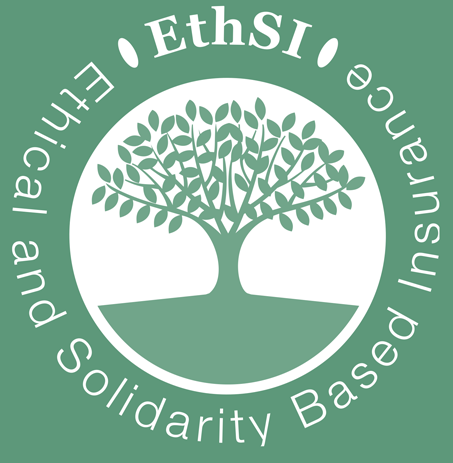Ethical insurance
What is ethical insurance?
For Arç Cooperativa, insurance management implemented according to ethical and community-based criteria not only leads to vital social benefits, but also introduces appropriate practices of mutual aid and ethical banking into the insurance market.
Mutualism: identifying insurance as a tool for the community; equity: guaranteeing universal access to this type of financing; and transparency: proposing a relationship between equals- are the three foundations of ethical insurance.

EthSI Mark
Arç Cooperativa is the first insurance brokerage in Europe to be awarded the highest degree of the segell EthSI standard for ethical and solidarity-based insurance management.
This qualification certifies the implementation of socially responsible practices and ethical investment, along with other ethical behaviour such as involvement in fairer economic practices or the use of ethical banking.
The EthSI criteria are applied to insurance products as much as agents and insurance companies and are evaluated each year by an independent committee of the Ethical Finance Observatory.
Ethical, solidarity-focused finance
In the insurance sector, as with the bank, investment may be the principal source of profit, but we must also allow for the forming of social and community bonds.
When financing is ethical, those who are saving, whether they be companies or individuals, have the right to know where their savings are being invested. As a result of this, finance entities must stop funding activities that are ethically objectionable and only invest in social and environmental projects. At the same time, they must facilitate access to credit for those collective groups that have traditionally been excluded.

Four key questions
1.
If you offer ethical insurance, why do you occasionally work with companies that do not have the EthSI stamp of approval?
At Arç Cooperativa, we believe that the development of ethical insurance is a process. We are not currently able to meet the insurance needs of every company, institution or person that we offer insurance to with ethically certified products because there are not enough certified companies. However, the dynamics are changing: today, in Spain alone, ethically certified insurance companies sell premiums worth a total of almost €800 million.
2.
Why doesn’t Arç Cooperativa work exclusively with certified companies?
Our objective is to cover all the insurance needs of the voluntary sector and organisations involved in the social and solidarity economy. We are determined to meet those needs with certified products, and until we can, we concentrate on increasing the purchasing power of consumers while putting pressure on companies to move toward the criteria of the segell EthSI mark. During this transition, we ensure that our clients benefit from lower prices that come about as a result of collective purchasing.
3.
What type of audit do these certified companies and brokers go through for this seal of approval?
The governing body of the EthSI mark, the Ethical Finance Observatory reviews all the relevant information along certain basic parameters and determines the degree of application. In the case of brokers like Arç Cooperativa, the validity of our sustainability report is examined, alongside any new updates we have made in areas that previously needed improvement. The type of company and its ethical code is the second aspect considered. The third important variable is the evolution of the organisation as a provider of ethical banking.
4.
Can Arç Cooperativa guarantee that insurance premiums will not be reinvested in businesses with little ethical value?
When the Ethical Finance Observatory registers an insurance company, one of the basic requirements is that a percentage of investment be ethically responsible. This means that at this moment of transition, it is possible that part of the investment may not be socially responsible. However, if a certified company is found to have made investments of “maximum ethical sensitivity” (e.g., weapons or fiscal paradises), the Observatory would withdraw the approval mark.

